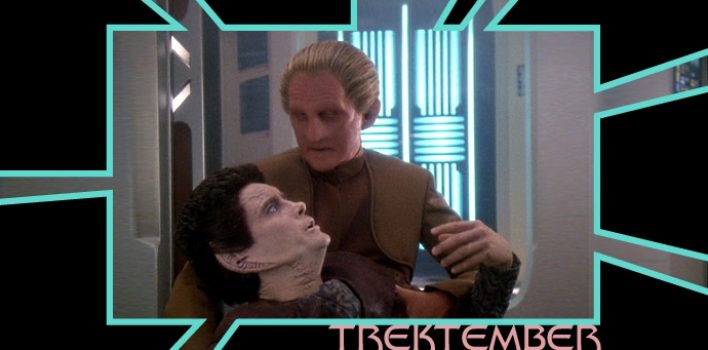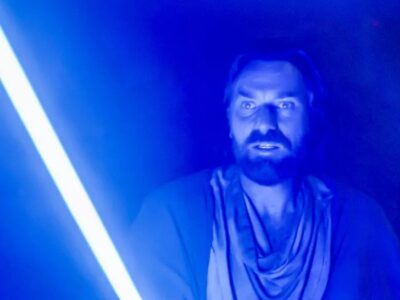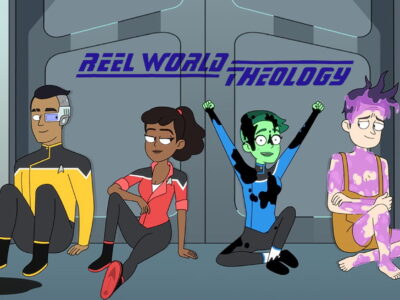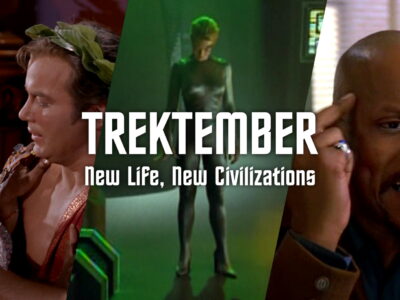Trektember: Treachery, Faith and the Great River
“Treachery, Faith and the Great River” contains, from my point of view, the second-funniest line ever written in the entirety of the Star Trek canon.
Weyoun: Let’s just say I left Cardassia because my life was in danger.
Odo: From whom?
Weyoun: Everyone.
Odo: Aren’t you being a little paranoid?
Weyoun: Of course I’m paranoid. Everyone’s trying to kill me.
When you’re talking to your god, everything else seems like a joke. The droll Vorta’s sublimely self-aware matter-of-factness turns this bottle episode into something special from beginning to end; and it imbues the very simple but clever pitch (“What if the Dominion general was a defective defector?”) into a transcendent and thoughtful narrative.
Throughout Deep Space Nine, the concept of religion and worship has been explored deeply; but this particular exploration of worship is particularly poignant, because it shows us what faith looks like when the object of our worship is right in front of us.
Made for Worship, Made for War
The Vorta are built to worship. They’re clones, and the Founders have modified their genetic code to make it biologically impossible for them to do anything else. On a genetic level, they’re programmed to adore the Changelings.
In this episode, we learn that the Founders made the Vorta their own because a family of Vorta were kind to a Changeling ages ago, harboring him when other “solids” pursued.
Weyoun: In return for saving his life, the changeling promised the Vorta that one day we would be transformed into powerful beings. That we would become an important part of a great new empire that would stretch across the Galaxy.
These tree-dwelling, ape-like beings became a chosen people; they were raised up to become something greater. Whether this is true or not is unclear, but it is the reality of their existence from which they operate: they were chosen by divine election and given a special blessing.
And so were we. God chose the people of Israel to worship Him; and then, after Jesus came, that blessing was extended to the people who took on the name of Christ.
I give water in the wilderness,
rivers in the desert,
to give drink to my chosen people,
the people whom I formed for myself
that they might declare my praise.—Isaiah 43:20–21, ESV
We all worship; it’s a biological imperative. We can’t not. For the Vorta, this worship takes the form of war. For many of us, this worship takes the form of a focus on family, or an addiction to work, or a fixation on sex, or a drive toward leisure, or any of a million other good things that we elevate to the divine; none of which can actually save us, or fulfill our worship.
But that worship should be all about peace; about declaring the praise of God, about expressing how great is the mercy of the Prince of Peace. That’s how we can be fulfilled: because God chose us to be agents of peace, we’re coded to worship Him. Even those who don’t are drawn to things that echo who He is; kind of like how Weyoun 6 abandoned the Founders and sought out the deific visage of a security officer.
In the Holy Presence of a Security Officer
Odo doesn’t want to be a god; and the things we worship aren’t always good objects of worship, either. Like Weyoun, we have every right to be paranoid; even our own good deeds are trying to kill us.
But everything changes when Weyoun enters the presence of his god: he has rejected that which seeks his death and instead seeks the favor of a god of peace and order. In many ways, he’s the same man in the runabout with Odo as he was before he met his celestial constable; the same dry, self-effacing wit, the same clever and single-minded solutions, the same devotion, the same curiosity. Yet for all the ways that he’s the same, his encounter with Odo has also made him different; he can’t stop looking at Odo. He’s more certain that the Dominion is going down the wrong path, that Odo is the only hope for the Dominion to be reborn as an empire of cooperation and peace. His paranoia has given way to ecstasy.
It reminds me of Moses’ face after he was in God’s presence.
When Moses came down from Mount Sinai, with the two tablets of the testimony in his hand as he came down from the mountain, Moses did not know that the skin of his face shone because he had been talking with God.
—Exodus 34:29, ESV
Being in the presence of God changes us. It makes us different; it gives us new priorities, new things to think about, even a new look on our face. People tend to notice, too; maybe even be concerned about us. We’re the same person—God does not take away our individuality, just our sin—but we’re also different. We’re empowered to take God’s message of mercy and peace to others; to glorify Him through the words He’s given us to say.
And maybe we’re also empowered to die.
Well done, good and faithful Vorta
This episode is about a lot of things. It’s about wanting desperately for your god to be pleased with you. It’s about being built to worship, and realizing that what you were worshipping was the wrong thing. It’s about being so dedicated to your god that you need to make them happy. It’s about worshipping the right god.
But at the end of Weyoun 6’s life, it’s about a man dying, his face illuminated by his god’s smile.
Odo begins to realize, by the end of this episode, that the Vorta will consider him a god whether he wants them to or not; all he can change is the way he interacts with them. Our God is different from the changeling in many, many ways; but, like Odo eventually does, He gives us what we need.
He desires to bless us; not to make us prosperous, but to make us holy. He desires to save us. And there isn’t anything we can give Him in return that He doesn’t already have. So how can we repay Him? King David wrote a Psalm musing about this very same question.
What shall I render to the LORD
for all his benefits to me?
I will lift up the cup of salvation
and call on the name of the LORD.
—Psalm 116:12–13, ESV
We can’t save God like Weyoun’s apelike ancestors. We can’t give God any intel He doesn’t already have, like Weyoun 6 did. But we can give Him our lives, to do with as He will. We can turn from our rebellion against Him, and run to Him for rescue. Like Weyoun, we can run headlong into His presence for salvation. We can lift up the cup of salvation and beg for our God’s blessing. Because that’s the worship that He made us for.
• • •
Editor’s note: The editors and staff at Reel World Theology were saddened to hear of Aron Eisenberg’s passing last weekend. Eisenberg played the Ferengi Nog in Star Trek: Deep Space Nine, a role with which he won over the hearts of many in the Star Trek fan community, and was, by all accounts, a wonderful person to be around; Nana Visitor called him “one of the bravest people I knew.” Our prayers go out to his family and friends, particularly to his wife Malíssa Longo and his sons Nicholas and Christopher.
Though this year’s Trektember articles were written before this loss, our upcoming piece about “It’s Only a Paper Moon” will address Eisenberg’s passing.







